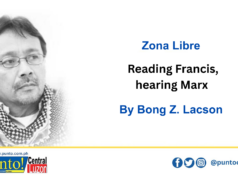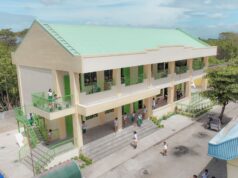WOKE UP to this FB post from seminary brother Archie C. Reyes, city information officer: “Almost there! Ready for the 1st fl oat parade of its kind ever to be witnessed in Angeles City and probably the rest of the country.
Be there and witness the history of Angeles City unfolds before your eyes. January 18, 2014 at 5:00 pm in front of the Holy Rosary Church and Museo ning Angeles.”
Got reminded there of the city’s grand celebration of its 50th year. And instinctively whipped out this brief of its American past in our book Agyu Tamu: Turning Tragedy into Triumph (2011).
“Three hundred years in a convent and 50 years in Hollywood.” Nowhere in the country is that anonymous wit’s encapsulation of Philippine history more manifest than in Angeles City.
The celestial beings that old Barrio Kuliat took for its name, a signal honor to the religiosity of its people.
Religiosity resonant in its main streets of Sto. Rosario and Sto. Entierro at which juncture stands the citadel of
faith, Holy Rosary Parish Church. Religiosity celebrated not just in one but two fiestas in October: On the second Sunday, La Naval in devotion to the Virgin whose intercession sparked the victory of the Spanish fleet against Dutch and British privateers in 1646; and on the last Friday, Piyestang Apu for Apung Mamacalulu or the Lord of Mercy.
At the opposite end of the moral divide stood – from 1903 – Clark Air Base, the largest American military installation outside continental USA. And right outside its very gates evolved Fields Avenue, a virtual city of camp followers: All-night and all-day clubs featuring shows of the most exotic and erotic kinds, shorttime motels and alley inns, beer gardens and massage parlors, women, women, women, of all ages, shapes and degrees of pulchritude, and – to be gender-equal – gays.
There too abounded the PX (post exchange) trade – of stateside goods smuggled out, purchased or pilfered from the Clark commissary. US Booster and Chuck Taylor. Baby Ruth and Hershey bars. Hanes and Fruit of the Loom. Jim Beam and Jack Daniel’s. Benson & Hedges and Hav-a-Tampa.
Apples and grapes. Playboy and Penthouse. Find them only at Dau and Nepo Mart. Ay the Checkpoint, immediately before the Clark main gate, flourished literal wheeling-anddealing – of used American gas guzzlers, from the sporty Mustang to the immense Cadillac, most prized by the locals as status symbols – whence arose an argot: “English Checkpoint,” best exampled when bargaining: “How low can you make it down, Joe?” (A variation: “What’s the lowest can you make it down?)
The Vietnam War spurred the city’s own gold rush, with Clark serving as logistics hub and forward base for the USAF’s bombing forays to stem the Red Tide – pursuant to the Cold War’s “Domino Theory” – about to sweep
through most of Southeast Asia. And the city all too willing to open its arms – and legs – to warweary soldiers for their R&R.
So ruled the Almighty Dollar. So reigned the American GI. In the city denigrated by the defenders of morality as having been founded on the very loins of an occupying army. The cudgel taken by the militants and nationalists finding conscientization in the damnation of the three isms shackling Filipino society: feudalism, imperialism and bureaucratcapitalism.
The perfunctory cries of “Yankees go home” rising to the belligerent screams of “Lansagin ang base militar” in scores of protest marches and rallies routinely dispersed by head-bashing, truncheon-wielding elements of the Philippine Air Force’s Clark Air Base Command.
Still, and all – neither nationalism nor sovereignty ever been found to fill an empty stomach, as some wisecrack of a politico once quipped – the city and its citizens welcomed the American presence as all-boon and neverbane to their very existence. Their economic empowerment solidly established, their social well-being firmly secured.
Having the cornucopia in Clark Air Base, ensconced in its pre-eminent status among communities, urban and rural in all of Northern and Central Luzon, Angeles City found little reason to fear, much less prepare, for the unknown. In the Epicurean ideal, the city rocked and its citizens rolled.



